Edie Melson's Blog, page 359
November 23, 2015
Keys to Choosing Blog Post Titles that Work
by Edie Melson @EdieMelson
 I spend a lot of time sharing other bloggers’ posts with my social media network. But spend even more time
passing over
valuable posts because my followers would have no idea what the post was about. So today I want to give you the basics of titling blog posts.
I spend a lot of time sharing other bloggers’ posts with my social media network. But spend even more time
passing over
valuable posts because my followers would have no idea what the post was about. So today I want to give you the basics of titling blog posts.
I pay a lot of attention to my blog post titles, and I often spend almost as much time composing them as I do writing an entire post.
They are that important!
Social media is a great thing for growing blogs, if you don’t allow blogging and social media to work at cross purposes. They need to compliment each other, and reinforce your message.
Remember, with a compelling title, a browser becomes a reader. Without a compelling title, the rest of your words might as well not be written.
We are writers, and we love words. Even more than that, we love to be clever. I get that.
But a blog post title isn’t a place to just be clever. For example, the title of the blog post you're reading this isn't very clever, but it’s very specific. Originally I thought about titling this post:
What’s That Mean?
That title, (What's that Mean?) is a play on a popular tagline found at the end of many current television shows. But that alone wouldn’t tell a reader what to expect. That’s why I chose a different title:
Keys to Choosing Blog Post Titles that Work
So go ahead, and play with words, but don’t do it in the title. Give your readers and potential readers the information they need!
If you’re still not quite sure what I mean, I’ve compiled a list of ambiguous blog post titles. These are taken from actual posts that I’ve found on the Internet. Take a minute to to figure out what the blog posts might be about before you read the answers below.
The Summer of Success
When Things Go South
In the Mood
I Live Next Door to a Cemetery
Choosing Joy Instead of Jealousy
Hooptedoodle and You
Perseverance Pays off
Three Steps to Prevent Overfiring
Not Quite What I expected
Take a Deep Breath
ANSWERS:The Summer of Success – about what writers can learn from the career of Donna Summer
When Things Go South - the fine line between showing enough of our characters life to immerse the reader and make it realistic without boring them to tears.
In the Mood – writing with determination
I Live Next Door to a Cemetery – odd places to find writing inspiration
Choosing Joy Instead of Jealousy – don’t be jealous over other WRITERS’ successes
Hooptedoodle and You – writing styles and how to pinpoint yours
Perseverance Pays off – becoming a published novelist isn’t the end, but the beginning.
Three Steps to Prevent Overfiring – comparing the warning on a wood stove with writing overload
Not Quite What I expected - If a craft project seems intimidating, don’t let it stop you. Give it a try anyway.
Take a Deep Breath – don’t get overwhelmed with the NaNoWriMo writing marathon
I hope I've illustrated the importance of choosing blog posts titles that don't confuse our readers. I'd love to hear your thoughts on this subject. Be sure to share them in the comments section below.
Don't forget to join the conversation.
Blessings,
Edie
TWEETABLES
Don't leave potential readers confused - choose blog post titles with care - @EdieMelson (Click to Tweet)
Keys to choosing blog posts titles that work - #blogging expert @EdieMelson (Click to Tweet)
 I spend a lot of time sharing other bloggers’ posts with my social media network. But spend even more time
passing over
valuable posts because my followers would have no idea what the post was about. So today I want to give you the basics of titling blog posts.
I spend a lot of time sharing other bloggers’ posts with my social media network. But spend even more time
passing over
valuable posts because my followers would have no idea what the post was about. So today I want to give you the basics of titling blog posts.I pay a lot of attention to my blog post titles, and I often spend almost as much time composing them as I do writing an entire post.
They are that important!
Social media is a great thing for growing blogs, if you don’t allow blogging and social media to work at cross purposes. They need to compliment each other, and reinforce your message.
Remember, with a compelling title, a browser becomes a reader. Without a compelling title, the rest of your words might as well not be written.
We are writers, and we love words. Even more than that, we love to be clever. I get that.
But a blog post title isn’t a place to just be clever. For example, the title of the blog post you're reading this isn't very clever, but it’s very specific. Originally I thought about titling this post:
What’s That Mean?
That title, (What's that Mean?) is a play on a popular tagline found at the end of many current television shows. But that alone wouldn’t tell a reader what to expect. That’s why I chose a different title:
Keys to Choosing Blog Post Titles that Work
So go ahead, and play with words, but don’t do it in the title. Give your readers and potential readers the information they need!
If you’re still not quite sure what I mean, I’ve compiled a list of ambiguous blog post titles. These are taken from actual posts that I’ve found on the Internet. Take a minute to to figure out what the blog posts might be about before you read the answers below.
The Summer of Success
When Things Go South
In the Mood
I Live Next Door to a Cemetery
Choosing Joy Instead of Jealousy
Hooptedoodle and You
Perseverance Pays off
Three Steps to Prevent Overfiring
Not Quite What I expected
Take a Deep Breath
ANSWERS:The Summer of Success – about what writers can learn from the career of Donna Summer
When Things Go South - the fine line between showing enough of our characters life to immerse the reader and make it realistic without boring them to tears.
In the Mood – writing with determination
I Live Next Door to a Cemetery – odd places to find writing inspiration
Choosing Joy Instead of Jealousy – don’t be jealous over other WRITERS’ successes
Hooptedoodle and You – writing styles and how to pinpoint yours
Perseverance Pays off – becoming a published novelist isn’t the end, but the beginning.
Three Steps to Prevent Overfiring – comparing the warning on a wood stove with writing overload
Not Quite What I expected - If a craft project seems intimidating, don’t let it stop you. Give it a try anyway.
Take a Deep Breath – don’t get overwhelmed with the NaNoWriMo writing marathon
I hope I've illustrated the importance of choosing blog posts titles that don't confuse our readers. I'd love to hear your thoughts on this subject. Be sure to share them in the comments section below.
Don't forget to join the conversation.
Blessings,
Edie
TWEETABLES
Don't leave potential readers confused - choose blog post titles with care - @EdieMelson (Click to Tweet)
Keys to choosing blog posts titles that work - #blogging expert @EdieMelson (Click to Tweet)
Published on November 23, 2015 01:00
November 22, 2015
We're Not Meant to do this Writing Thing Alone
by Brenda McGraw @BrendaMMcGraw
 Alone again, me and my words.
Alone again, me and my words.
When was the last time you felt like you were on your own with no one by your side or encouraging you?
Writing is sometimes a lonely calling.
We touch the keyboard and are supposed to type words and make them jump off the page and touch the hearts and lives of others.Day after day we think thoughts and the thoughts are supposed to turn to stories of hope and inspiration.
 Unless you are writer it is hard to understand what really goes into writing a blog, a book or an article. Your spouse doesn’t really get it. Your friends are pulling for you, but many with a jealous tinge of “I wish I could do that.” Your brothers and sisters are proud, but think it’s just a hobby. Your young children don’t really care; they just want mom or dad to pay them some attention.
Unless you are writer it is hard to understand what really goes into writing a blog, a book or an article. Your spouse doesn’t really get it. Your friends are pulling for you, but many with a jealous tinge of “I wish I could do that.” Your brothers and sisters are proud, but think it’s just a hobby. Your young children don’t really care; they just want mom or dad to pay them some attention.
What do I mean when I say, “You are not meant to do this alone”? Because it sure feels like we are all alone sometimes.
The cross seems heavy to bear; it did for Jesus, too. It was so heavy that the Roman soldiers called a man out of the crowd to help him carry it. If Jesus needed help during despairing times, so do we. Look around. We believers are supposed to pray and help carry the burdens of those we love. Jesus carried our burdens all the way to the cross at Calvary.
Again I say look around. There are plenty of other writers who need an encouraging glance their way, a Facebook “Like” or “Share”, or they need to be asked what you can do to help them. As a Christian writer, we are in this together, not to go it alone. We may use different genres, but we are all carrying the same message to the world through our words.
 “Lean on me” is the title of a song by Kirk Franklin. Who are you leaning on? Who are you allowing to lean on you?
“Lean on me” is the title of a song by Kirk Franklin. Who are you leaning on? Who are you allowing to lean on you?
When I was called to write 13 years ago I knew nothing about the art of words. I needed a mentor and had no one. My dreams died temporarily, but were resurrected again 10 years later when I heard about an online writing course and signed up. I can’t say that I found a mentor, but I did find a lot of encouragement. We need to lean on, help and support each other. It’s not about us individually; it’s all about the Lord.
You are not meant to do this all alone. Ask God to lead you. We have heard many times how God knows everyone and He can arrange a divine appointment for you to meet someone who will help you take your writing to the next level. This is true. We need to make an effort to go to conferences, join writing communities and take courses. God has a plan. Trust Him. He Himself will never leave you.
“But you, Israel, my servant, Jacob, whom I have chosen, you descendants of Abraham my friend, I took you from the ends of the earth, from its farthest corners I called you. I said, ‘You are my servant’; I have chosen you and have not rejected you.
So do not fear, for I am with you; do not be dismayed, for I am your God. I will strengthen you and help you; I will uphold you with my righteous right hand.” Isaiah 41:8-10
My challenge to you is, to find one person this week whom you can offer to help with their writing or platform. God will reward you.
Have a happy and blessed Thanksgiving!
TWEETABLEWe're not meant to do this #writing thing alone - @BrendaMMcGraw on @EdieMelson (Click to Tweet)
 Brenda McGraw is an author and speaker who reveals how to discover joy beyond the clutter of life. She draws from her own life experiences in the #1 Amazon Best seller, “Joy Beyond, 28 Days to Finding Joy Beyond the Clutter of Life”. She is the founder of Ask God Today Ministries where she has a team of writers sharing truth and hope with others.
Brenda McGraw is an author and speaker who reveals how to discover joy beyond the clutter of life. She draws from her own life experiences in the #1 Amazon Best seller, “Joy Beyond, 28 Days to Finding Joy Beyond the Clutter of Life”. She is the founder of Ask God Today Ministries where she has a team of writers sharing truth and hope with others.
Brenda currently lives in South Carolina with her husband, Jeff and three of their five children. She is a survivor of breast cancer and a heart attack.. Despite the challenges she has endured, Brenda found peace through her relationship with Jesus Christ.
You can connect with Brenda at:Website - http://www.askgodtoday.com Amazon Author Page: http://www.amazon.com/Brenda-McGraw/e/B00GOIE7AG Twitter: https://www.twitter.com/BrendaMMcGraw
 Alone again, me and my words.
Alone again, me and my words. When was the last time you felt like you were on your own with no one by your side or encouraging you?
Writing is sometimes a lonely calling.
We touch the keyboard and are supposed to type words and make them jump off the page and touch the hearts and lives of others.Day after day we think thoughts and the thoughts are supposed to turn to stories of hope and inspiration.
 Unless you are writer it is hard to understand what really goes into writing a blog, a book or an article. Your spouse doesn’t really get it. Your friends are pulling for you, but many with a jealous tinge of “I wish I could do that.” Your brothers and sisters are proud, but think it’s just a hobby. Your young children don’t really care; they just want mom or dad to pay them some attention.
Unless you are writer it is hard to understand what really goes into writing a blog, a book or an article. Your spouse doesn’t really get it. Your friends are pulling for you, but many with a jealous tinge of “I wish I could do that.” Your brothers and sisters are proud, but think it’s just a hobby. Your young children don’t really care; they just want mom or dad to pay them some attention. What do I mean when I say, “You are not meant to do this alone”? Because it sure feels like we are all alone sometimes.
The cross seems heavy to bear; it did for Jesus, too. It was so heavy that the Roman soldiers called a man out of the crowd to help him carry it. If Jesus needed help during despairing times, so do we. Look around. We believers are supposed to pray and help carry the burdens of those we love. Jesus carried our burdens all the way to the cross at Calvary.
Again I say look around. There are plenty of other writers who need an encouraging glance their way, a Facebook “Like” or “Share”, or they need to be asked what you can do to help them. As a Christian writer, we are in this together, not to go it alone. We may use different genres, but we are all carrying the same message to the world through our words.
 “Lean on me” is the title of a song by Kirk Franklin. Who are you leaning on? Who are you allowing to lean on you?
“Lean on me” is the title of a song by Kirk Franklin. Who are you leaning on? Who are you allowing to lean on you? When I was called to write 13 years ago I knew nothing about the art of words. I needed a mentor and had no one. My dreams died temporarily, but were resurrected again 10 years later when I heard about an online writing course and signed up. I can’t say that I found a mentor, but I did find a lot of encouragement. We need to lean on, help and support each other. It’s not about us individually; it’s all about the Lord.
You are not meant to do this all alone. Ask God to lead you. We have heard many times how God knows everyone and He can arrange a divine appointment for you to meet someone who will help you take your writing to the next level. This is true. We need to make an effort to go to conferences, join writing communities and take courses. God has a plan. Trust Him. He Himself will never leave you.
“But you, Israel, my servant, Jacob, whom I have chosen, you descendants of Abraham my friend, I took you from the ends of the earth, from its farthest corners I called you. I said, ‘You are my servant’; I have chosen you and have not rejected you.
So do not fear, for I am with you; do not be dismayed, for I am your God. I will strengthen you and help you; I will uphold you with my righteous right hand.” Isaiah 41:8-10
My challenge to you is, to find one person this week whom you can offer to help with their writing or platform. God will reward you.
Have a happy and blessed Thanksgiving!
TWEETABLEWe're not meant to do this #writing thing alone - @BrendaMMcGraw on @EdieMelson (Click to Tweet)
 Brenda McGraw is an author and speaker who reveals how to discover joy beyond the clutter of life. She draws from her own life experiences in the #1 Amazon Best seller, “Joy Beyond, 28 Days to Finding Joy Beyond the Clutter of Life”. She is the founder of Ask God Today Ministries where she has a team of writers sharing truth and hope with others.
Brenda McGraw is an author and speaker who reveals how to discover joy beyond the clutter of life. She draws from her own life experiences in the #1 Amazon Best seller, “Joy Beyond, 28 Days to Finding Joy Beyond the Clutter of Life”. She is the founder of Ask God Today Ministries where she has a team of writers sharing truth and hope with others.
Brenda currently lives in South Carolina with her husband, Jeff and three of their five children. She is a survivor of breast cancer and a heart attack.. Despite the challenges she has endured, Brenda found peace through her relationship with Jesus Christ.
You can connect with Brenda at:Website - http://www.askgodtoday.com Amazon Author Page: http://www.amazon.com/Brenda-McGraw/e/B00GOIE7AG Twitter: https://www.twitter.com/BrendaMMcGraw
Published on November 22, 2015 01:00
November 21, 2015
The Writing Life
Edie here. Today, marks the beginning of something new here on the blog. Two to three times a month, in place of the usual Social Media Image Saturday, I'll be introducing you to some of my author friends. So without further ado, I'm happy to introduce you my first guest author, Gail Kittleson. I was fortunate to be invited to appear on her blog, Dare to Bloom, back in May and I'm so excited to have her on The Write Conversation. Be sure to give her your usual warm welcome!
The Writing Life
by Gail Kittleson @GailGKittleson
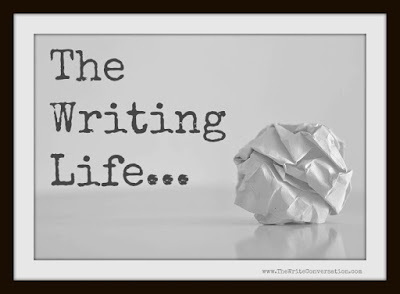 Writing takes confidence. What a comforting thought as I look back over those unproductive years, my “wasted years.” Without believing that our words and unique perspective matter, who finds the courage to write? Yet Virgil wrote, “Fortune favors the brave.”
Writing takes confidence. What a comforting thought as I look back over those unproductive years, my “wasted years.” Without believing that our words and unique perspective matter, who finds the courage to write? Yet Virgil wrote, “Fortune favors the brave.”
But if nobody else can create the precise stories that come to us, begging to be penned, then we have a mission. Unless we tell this tale, who will? And if this story remains unwritten, if we hide it under a bushel, who will miss embracing its truth?
Writing means facilitating feelings in our reader. We want them to feel what we’ve felt, what we sense deep within. We avoid words like elated, sad, disappointed, miserable, and hesitant, because we want to evoke emotion in the reader, not tell them how to feel. Memoir writing taught me that even in nonfiction, the goal is the reader’s emotion. The Glass Castle’s startling image of the author’s mother digging in a dumpster stays with me. So does the young heroine's utter terror in To Kill a Mockingbird, and a thousand other emotional responses various authors worked hard to stir up in me.
 That’s what it’s about—the connection between writer and reader, the power flow from spirit to spirit, soul to soul. It’s why we speak of “beloved authors.” They’ve moved us in one way or another—to grief, to longing, to ecstasy, to puzzlement or distress. It's why I want to meet Isaiah in heaven—his words have made all the difference in my journey.
That’s what it’s about—the connection between writer and reader, the power flow from spirit to spirit, soul to soul. It’s why we speak of “beloved authors.” They’ve moved us in one way or another—to grief, to longing, to ecstasy, to puzzlement or distress. It's why I want to meet Isaiah in heaven—his words have made all the difference in my journey.
As writers, we must believe in ourselves, in our intrinsic value. This was where I got lost on the way to authorship. For shame-based would-be writers, the trek to confidence, fraught with speculation and introspection, seems to take forever. But little by little, step-by-step, I heard my voice—found my voice, as they say. The writing life involved waiting for things to shift into place inside me before confidence gradually slipped in. Oh, I kept busy, but I was merely dabbling in my passion.
Instructing college expository writing helped tremendously. I love cheerleading students who believe they can’t write. They can, of course, and what fun to join in their colossal discovery. The involved process of helping them find their theme, cut unnecessary verbiage, and choose strong verbs to hone their truth honed mine: I needed to write again.
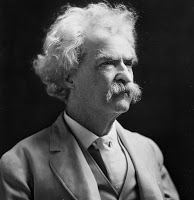 As Mark Twain quipped, “The two more important days in your life are the day you were born and the day you find out why.” I would add the day you develop the confidence to answer that call. Now, after years of learning fiction skills, my debut novel has released. No, none of the big names picked it up, but the small company that did assigned it to their Vintage line and classifies it SUPER SWEET. That means the entire book contains nary a reason to blush.
As Mark Twain quipped, “The two more important days in your life are the day you were born and the day you find out why.” I would add the day you develop the confidence to answer that call. Now, after years of learning fiction skills, my debut novel has released. No, none of the big names picked it up, but the small company that did assigned it to their Vintage line and classifies it SUPER SWEET. That means the entire book contains nary a reason to blush.
Yet Dottie, the heroine, shares her story with clarity and purpose. After all, she thinks, there must be a purpose—she survived losing her only son to World War II. On top of that, her daughter Cora moved to California straight out of high school to work for the war effort, married a sailor and settled down in the Golden State—another loss.
Dottie contributes to her everyday post-war world in down-to-earth ways—cooking and cleaning, volunteering at her church, and tending her garden. But when troubles arise in Cora’s third pregnancy, old fears inhibit Dottie from traveling across the country to help her and meet those precious grandbabies. And as that elusive, intangible quality of confidence grows in Dottie, so does the interest of the widower next door.
This story links with every woman who’s ever traveled the road from anxiety to confidence. Dottie’s become very real to me—I hope readers will embrace her and cheer her on, while I continue writing and believing.
TWEETABLE
Thoughts on the #Writing Life - via @GailGKittleson on @EdieMelson (Click to Tweet)
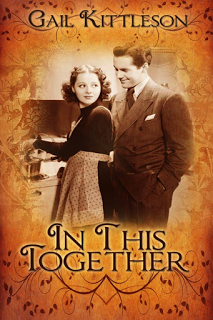 Blurb: It’s 1946. Dottie Kyle, an everyday Midwestern woman who lost her only son in the war and her husband soon after, takes a cooking/cleaning job at a local boarding house. But when a new employee is hired, complications arise, and when they niggle Dottie’s “justice meter”, she must decide whether to speak up or not.
Blurb: It’s 1946. Dottie Kyle, an everyday Midwestern woman who lost her only son in the war and her husband soon after, takes a cooking/cleaning job at a local boarding house. But when a new employee is hired, complications arise, and when they niggle Dottie’s “justice meter”, she must decide whether to speak up or not.
At the same time, her daughter's pregnancy goes awry and the little California grandchildren she's never met need her desperately. But an old fear blocks her way. When the widower next door shows Dottie unexpected attention, she has no idea he might hold the clue to unlocking her long-held anxieties.
 Gail Kittleson:Our stories are our best gifts, and blooming late has its advantages—the novel fodder never ends. Gail writes from northern Iowa, where she and her husband enjoy gardening and grandchildren. WhiteFire Publishing released Gail’s memoir, Catching Up With Daylight in 2013, and her debut women’s historical fiction, In This Together (Wild Rose Press/Vintage Line) greets the world on November 18, 2015. Please feel free to contact her—meeting new reading friends is the frosting on her cake!
Gail Kittleson:Our stories are our best gifts, and blooming late has its advantages—the novel fodder never ends. Gail writes from northern Iowa, where she and her husband enjoy gardening and grandchildren. WhiteFire Publishing released Gail’s memoir, Catching Up With Daylight in 2013, and her debut women’s historical fiction, In This Together (Wild Rose Press/Vintage Line) greets the world on November 18, 2015. Please feel free to contact her—meeting new reading friends is the frosting on her cake!
http://www.gailkittleson.com/ www.facebook.com/gail.kittleson https://www.facebook.com/Gail-Kittleson-author-1799350843625035/timeline/ https://www.linkedin.com/pub/gail-kittleson/43/935/b06 https://www.goodreads.com/author/show/3459831.Gail_Kittleson
The Writing Life
by Gail Kittleson @GailGKittleson
 Writing takes confidence. What a comforting thought as I look back over those unproductive years, my “wasted years.” Without believing that our words and unique perspective matter, who finds the courage to write? Yet Virgil wrote, “Fortune favors the brave.”
Writing takes confidence. What a comforting thought as I look back over those unproductive years, my “wasted years.” Without believing that our words and unique perspective matter, who finds the courage to write? Yet Virgil wrote, “Fortune favors the brave.”But if nobody else can create the precise stories that come to us, begging to be penned, then we have a mission. Unless we tell this tale, who will? And if this story remains unwritten, if we hide it under a bushel, who will miss embracing its truth?
Writing means facilitating feelings in our reader. We want them to feel what we’ve felt, what we sense deep within. We avoid words like elated, sad, disappointed, miserable, and hesitant, because we want to evoke emotion in the reader, not tell them how to feel. Memoir writing taught me that even in nonfiction, the goal is the reader’s emotion. The Glass Castle’s startling image of the author’s mother digging in a dumpster stays with me. So does the young heroine's utter terror in To Kill a Mockingbird, and a thousand other emotional responses various authors worked hard to stir up in me.
 That’s what it’s about—the connection between writer and reader, the power flow from spirit to spirit, soul to soul. It’s why we speak of “beloved authors.” They’ve moved us in one way or another—to grief, to longing, to ecstasy, to puzzlement or distress. It's why I want to meet Isaiah in heaven—his words have made all the difference in my journey.
That’s what it’s about—the connection between writer and reader, the power flow from spirit to spirit, soul to soul. It’s why we speak of “beloved authors.” They’ve moved us in one way or another—to grief, to longing, to ecstasy, to puzzlement or distress. It's why I want to meet Isaiah in heaven—his words have made all the difference in my journey.As writers, we must believe in ourselves, in our intrinsic value. This was where I got lost on the way to authorship. For shame-based would-be writers, the trek to confidence, fraught with speculation and introspection, seems to take forever. But little by little, step-by-step, I heard my voice—found my voice, as they say. The writing life involved waiting for things to shift into place inside me before confidence gradually slipped in. Oh, I kept busy, but I was merely dabbling in my passion.
Instructing college expository writing helped tremendously. I love cheerleading students who believe they can’t write. They can, of course, and what fun to join in their colossal discovery. The involved process of helping them find their theme, cut unnecessary verbiage, and choose strong verbs to hone their truth honed mine: I needed to write again.
 As Mark Twain quipped, “The two more important days in your life are the day you were born and the day you find out why.” I would add the day you develop the confidence to answer that call. Now, after years of learning fiction skills, my debut novel has released. No, none of the big names picked it up, but the small company that did assigned it to their Vintage line and classifies it SUPER SWEET. That means the entire book contains nary a reason to blush.
As Mark Twain quipped, “The two more important days in your life are the day you were born and the day you find out why.” I would add the day you develop the confidence to answer that call. Now, after years of learning fiction skills, my debut novel has released. No, none of the big names picked it up, but the small company that did assigned it to their Vintage line and classifies it SUPER SWEET. That means the entire book contains nary a reason to blush.Yet Dottie, the heroine, shares her story with clarity and purpose. After all, she thinks, there must be a purpose—she survived losing her only son to World War II. On top of that, her daughter Cora moved to California straight out of high school to work for the war effort, married a sailor and settled down in the Golden State—another loss.
Dottie contributes to her everyday post-war world in down-to-earth ways—cooking and cleaning, volunteering at her church, and tending her garden. But when troubles arise in Cora’s third pregnancy, old fears inhibit Dottie from traveling across the country to help her and meet those precious grandbabies. And as that elusive, intangible quality of confidence grows in Dottie, so does the interest of the widower next door.
This story links with every woman who’s ever traveled the road from anxiety to confidence. Dottie’s become very real to me—I hope readers will embrace her and cheer her on, while I continue writing and believing.
TWEETABLE
Thoughts on the #Writing Life - via @GailGKittleson on @EdieMelson (Click to Tweet)
 Blurb: It’s 1946. Dottie Kyle, an everyday Midwestern woman who lost her only son in the war and her husband soon after, takes a cooking/cleaning job at a local boarding house. But when a new employee is hired, complications arise, and when they niggle Dottie’s “justice meter”, she must decide whether to speak up or not.
Blurb: It’s 1946. Dottie Kyle, an everyday Midwestern woman who lost her only son in the war and her husband soon after, takes a cooking/cleaning job at a local boarding house. But when a new employee is hired, complications arise, and when they niggle Dottie’s “justice meter”, she must decide whether to speak up or not. At the same time, her daughter's pregnancy goes awry and the little California grandchildren she's never met need her desperately. But an old fear blocks her way. When the widower next door shows Dottie unexpected attention, she has no idea he might hold the clue to unlocking her long-held anxieties.
 Gail Kittleson:Our stories are our best gifts, and blooming late has its advantages—the novel fodder never ends. Gail writes from northern Iowa, where she and her husband enjoy gardening and grandchildren. WhiteFire Publishing released Gail’s memoir, Catching Up With Daylight in 2013, and her debut women’s historical fiction, In This Together (Wild Rose Press/Vintage Line) greets the world on November 18, 2015. Please feel free to contact her—meeting new reading friends is the frosting on her cake!
Gail Kittleson:Our stories are our best gifts, and blooming late has its advantages—the novel fodder never ends. Gail writes from northern Iowa, where she and her husband enjoy gardening and grandchildren. WhiteFire Publishing released Gail’s memoir, Catching Up With Daylight in 2013, and her debut women’s historical fiction, In This Together (Wild Rose Press/Vintage Line) greets the world on November 18, 2015. Please feel free to contact her—meeting new reading friends is the frosting on her cake!
http://www.gailkittleson.com/ www.facebook.com/gail.kittleson https://www.facebook.com/Gail-Kittleson-author-1799350843625035/timeline/ https://www.linkedin.com/pub/gail-kittleson/43/935/b06 https://www.goodreads.com/author/show/3459831.Gail_Kittleson
Published on November 21, 2015 01:00
November 20, 2015
Four Things I Wish I 'd Known BEFORE I Started Indie Publishing
by Traci Tyne Hilton @TraciTyneHilton
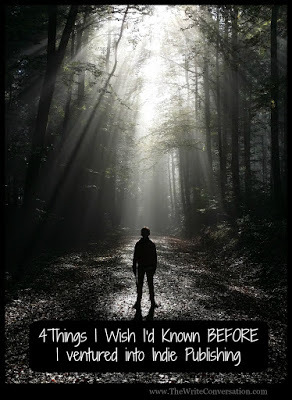 1. The Mysterious World of EditingMany indie careers are launched in November, when The Office of Letters and Light (Nanowrimo) gives away the free Createspace proof copy to all of the winners. Createspace wisely gives you time (6 months, when I did it) to use the coupon code.
1. The Mysterious World of EditingMany indie careers are launched in November, when The Office of Letters and Light (Nanowrimo) gives away the free Createspace proof copy to all of the winners. Createspace wisely gives you time (6 months, when I did it) to use the coupon code.
During those six months all first time indie authors need, desperately need, to hire an editor. (I may be projecting here.)If you are writing your first book ever this November, then when you are done, I suggest you set the book aside and enjoy the feeling of accomplishment. Give yourself some space from the book, then dive into self edits. When you are done, hunt down a handful of talented and experienced writers.
My first suggestion, if this is your first novel, is to find a critique group and bring some pages for feedback. If you can’t, then you need line editors to tell you how well your words work together, beta readers to give you an idea of how well your story works, and finally a proofreader who can clean the whole document up before you publish. Where do you find these magic people? Word of mouth is the best, in my opinion. Ask your writer friends, hang out in some writer groups on Facebook and ask there. Basically, anywhere that writers hang out, start asking. Or Google, but your mileage may vary.
There are other important places to invest money as a new business person, but this is the first and the most.
2. The Mysterious World of Record KeepingThe second thing I wish I had known when I started as an indie author was how to keep records. This is perfectly simple to some people, I’m sure. But a lot of writers are sort of left-brained artsy types, so it’s not all that simple. I’m one of those. And around five years ago when I started my indie journey, I developed terrible habits that haunt me still.
Keeping track of your daily sales and ads is vitally important. That data helps you plot your marketing schemes. This is obvious, I suppose, but keeping a spread sheet and filling it in every day is not my strong point.
Another important thing to keep track of is business expenses. I don’t take these lightly, but that doesn’t mean I do it efficiently. Most of my business bucks are spent via Paypal, and it is simple enough to do all at once on a rainy Saturday. That said, it is a lot easier to take care of it like a grownup.
One simple way to keep track of your expenses if you aren’t the kind of person to record them on the spot, is to move every emailed receipt into a special folder called “receipts.” This million dollar idea just occurred to me today, so, yeah. I’m definitely not a naturally organized business person.
3.The Mysterious World of TaxesThinking of business expenses, I wish I had known more about taxes when I started. This is where I tell you to call a CPA and discuss the best way to set up your writing business. The odds of making money as an indie are pretty good, and if this is your second or third family income source you may well find yourself in a new tax bracket.
Think I’m being overly optimistic? A few surveys of indie writers have found that the real news of indie publishing is how very many people are making between $200 and $500 a month on their writing. No, it’s not quit your job money, but if you have a job, and your spouse has one too, then you may have tax consequences from an extra $6000 a year. (Source: http://beverleykendall.com/files/self...)
 Talking to a CPA should answer all of your questions simply enough, but I found Limited Liability Companies for Dummies to be a valuable resource.
Talking to a CPA should answer all of your questions simply enough, but I found Limited Liability Companies for Dummies to be a valuable resource.
4. The Mysterious World of Time ManagementAnd finally, I wish I had known how to tune out social media. My worst habit is to pop back online when I don’t know what happens next in a book/chapter/paragraph/sentence. (So, pop over to Facebook and say “hi!” I’m sure I’m there, right now! https://www.facebook.com/tracihiltonauthor.)
Fortunately there are great plug-ins to help with this problem. Focal Filter is one. You can download it to your computer and set the sites you want it to blog and how long you want to block them. Another one, for Chrome users is StayFocused. It blocked Chrome so well for me that I started using Explorer to go online instead.
The most effective tool I’ve found, for me, is a simple word processor. That’s right. A little guy called Alphasmart. First designed for use in school, the Alpha smart has no proper screen. It plugs into my computer via USB and uploads my content directly to my word processing software when I am ready. You can buy them used on Amazon for around $40. (This is a business expense so save that receipt!)
These basics were foreign to me, and may be to you, as well. If so, I hope this little post helped! Sometimes the most valuable tool in starting a new venture is just chatting with someone who has been doing the same thing for a little while. And hey, I’m probably on Facebook right now, so feel free to come by for a chat!
TWEETABLES
4 Things I Wish I'd Known BEFORE I Began #IndiePublishing - @TraciTyneHilton on @EdieMelson (Click to Tweet)
Learn Some of the Mysteries of #IndiePub from expert @TraciTyneHilton on @EdieMelson (Click to Tweet)
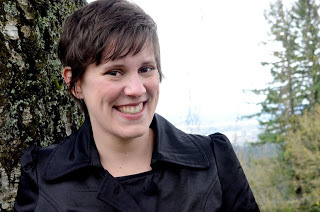 Traci Tyne Hilton is the author of The Plain Jane Mysteries, The Mitzy Neuhaus Mysteries and the Tillgiven Romantic Mysteries. Traci has a degree in history from Portland State University and still lives in the rainiest part of the Pacific Northwest with her husband the mandolin playing funeral director, two busy kids, and their dogs, Dr. Watson and Archie Goodwin.
Traci Tyne Hilton is the author of The Plain Jane Mysteries, The Mitzy Neuhaus Mysteries and the Tillgiven Romantic Mysteries. Traci has a degree in history from Portland State University and still lives in the rainiest part of the Pacific Northwest with her husband the mandolin playing funeral director, two busy kids, and their dogs, Dr. Watson and Archie Goodwin.
More of Traci’s work can be found at www.tracihilton.com
 1. The Mysterious World of EditingMany indie careers are launched in November, when The Office of Letters and Light (Nanowrimo) gives away the free Createspace proof copy to all of the winners. Createspace wisely gives you time (6 months, when I did it) to use the coupon code.
1. The Mysterious World of EditingMany indie careers are launched in November, when The Office of Letters and Light (Nanowrimo) gives away the free Createspace proof copy to all of the winners. Createspace wisely gives you time (6 months, when I did it) to use the coupon code. During those six months all first time indie authors need, desperately need, to hire an editor. (I may be projecting here.)If you are writing your first book ever this November, then when you are done, I suggest you set the book aside and enjoy the feeling of accomplishment. Give yourself some space from the book, then dive into self edits. When you are done, hunt down a handful of talented and experienced writers.
My first suggestion, if this is your first novel, is to find a critique group and bring some pages for feedback. If you can’t, then you need line editors to tell you how well your words work together, beta readers to give you an idea of how well your story works, and finally a proofreader who can clean the whole document up before you publish. Where do you find these magic people? Word of mouth is the best, in my opinion. Ask your writer friends, hang out in some writer groups on Facebook and ask there. Basically, anywhere that writers hang out, start asking. Or Google, but your mileage may vary.
There are other important places to invest money as a new business person, but this is the first and the most.
2. The Mysterious World of Record KeepingThe second thing I wish I had known when I started as an indie author was how to keep records. This is perfectly simple to some people, I’m sure. But a lot of writers are sort of left-brained artsy types, so it’s not all that simple. I’m one of those. And around five years ago when I started my indie journey, I developed terrible habits that haunt me still.
Keeping track of your daily sales and ads is vitally important. That data helps you plot your marketing schemes. This is obvious, I suppose, but keeping a spread sheet and filling it in every day is not my strong point.
Another important thing to keep track of is business expenses. I don’t take these lightly, but that doesn’t mean I do it efficiently. Most of my business bucks are spent via Paypal, and it is simple enough to do all at once on a rainy Saturday. That said, it is a lot easier to take care of it like a grownup.
One simple way to keep track of your expenses if you aren’t the kind of person to record them on the spot, is to move every emailed receipt into a special folder called “receipts.” This million dollar idea just occurred to me today, so, yeah. I’m definitely not a naturally organized business person.
3.The Mysterious World of TaxesThinking of business expenses, I wish I had known more about taxes when I started. This is where I tell you to call a CPA and discuss the best way to set up your writing business. The odds of making money as an indie are pretty good, and if this is your second or third family income source you may well find yourself in a new tax bracket.
Think I’m being overly optimistic? A few surveys of indie writers have found that the real news of indie publishing is how very many people are making between $200 and $500 a month on their writing. No, it’s not quit your job money, but if you have a job, and your spouse has one too, then you may have tax consequences from an extra $6000 a year. (Source: http://beverleykendall.com/files/self...)
 Talking to a CPA should answer all of your questions simply enough, but I found Limited Liability Companies for Dummies to be a valuable resource.
Talking to a CPA should answer all of your questions simply enough, but I found Limited Liability Companies for Dummies to be a valuable resource. 4. The Mysterious World of Time ManagementAnd finally, I wish I had known how to tune out social media. My worst habit is to pop back online when I don’t know what happens next in a book/chapter/paragraph/sentence. (So, pop over to Facebook and say “hi!” I’m sure I’m there, right now! https://www.facebook.com/tracihiltonauthor.)
Fortunately there are great plug-ins to help with this problem. Focal Filter is one. You can download it to your computer and set the sites you want it to blog and how long you want to block them. Another one, for Chrome users is StayFocused. It blocked Chrome so well for me that I started using Explorer to go online instead.
The most effective tool I’ve found, for me, is a simple word processor. That’s right. A little guy called Alphasmart. First designed for use in school, the Alpha smart has no proper screen. It plugs into my computer via USB and uploads my content directly to my word processing software when I am ready. You can buy them used on Amazon for around $40. (This is a business expense so save that receipt!)
These basics were foreign to me, and may be to you, as well. If so, I hope this little post helped! Sometimes the most valuable tool in starting a new venture is just chatting with someone who has been doing the same thing for a little while. And hey, I’m probably on Facebook right now, so feel free to come by for a chat!
TWEETABLES
4 Things I Wish I'd Known BEFORE I Began #IndiePublishing - @TraciTyneHilton on @EdieMelson (Click to Tweet)
Learn Some of the Mysteries of #IndiePub from expert @TraciTyneHilton on @EdieMelson (Click to Tweet)
 Traci Tyne Hilton is the author of The Plain Jane Mysteries, The Mitzy Neuhaus Mysteries and the Tillgiven Romantic Mysteries. Traci has a degree in history from Portland State University and still lives in the rainiest part of the Pacific Northwest with her husband the mandolin playing funeral director, two busy kids, and their dogs, Dr. Watson and Archie Goodwin.
Traci Tyne Hilton is the author of The Plain Jane Mysteries, The Mitzy Neuhaus Mysteries and the Tillgiven Romantic Mysteries. Traci has a degree in history from Portland State University and still lives in the rainiest part of the Pacific Northwest with her husband the mandolin playing funeral director, two busy kids, and their dogs, Dr. Watson and Archie Goodwin.More of Traci’s work can be found at www.tracihilton.com
Published on November 20, 2015 01:00
November 19, 2015
Beat Writing Deadlines the Smart Way
by Cyle Young @CyleYoung
 Beat writing deadlines the smart way!Do you wish you could beat writing deadlines, the smart way?
Beat writing deadlines the smart way!Do you wish you could beat writing deadlines, the smart way?
Well, now you can!
If you have ever struggled to beat deadlines, or struggled to hold yourself accountable to deadlines that you set yourself, be relieved. Modern research has provided some powerful insight to human psyche.M.I.T. the Massachusetts Institute of Technology recently completed a study. In the study they tested whether or not students who had hard deadlines performed better or worse on their final project scores.
The testing group was broken into three groups. In group one, each student set his or her own deadlines. In group two, hard deadlines were set for the project and the student had no control. For the last group, each student just had to turn all the work in by the end of the class.
 The group of students who had total and compete freedom scored the worst and had the worst performance on their work, and the group of students who could set their own deadlines performed average.
The group of students who had total and compete freedom scored the worst and had the worst performance on their work, and the group of students who could set their own deadlines performed average.
But unlike the other groups, the group of students with rigid deadlines that were beyond their control scored substantially better than all other students.
It wasn’t even close.
Writing is an industry that thrives on deadlines. If you want to work in the industry, you must be able to provide quality copy, often on tight deadlines. Whether it’s a writing contest, an agent proposal submission, or a contract deadline with a publishing house, writers need to deliver their work on time—every time.
How can you use this information to not only help you meet or beat deadlines?
Stop setting your own.
If you have a publishing editor or an agent. Ask them to set firm deadlines for you to submit your manuscript, edits, etc.
 If you are not yet represented by a literary agent, and not working on contract with a publishing house, get someone else to set your deadlines for you. This could be a spouse, a relative, or friend.
If you are not yet represented by a literary agent, and not working on contract with a publishing house, get someone else to set your deadlines for you. This could be a spouse, a relative, or friend.
But is imperative that the person is unyielding and unbending. Give them full authority to pester and annoy you unless you meet your deadlines. And remember no person will want to help you set deadlines for long, if you don’t respect the relationship, and make sure to always turn your work in to them on time.
Do you struggle with keeping your own deadlines? Comment below with ideas or methods that you have tried.
TWEETABLE
Beat #Writing Deadlines the Smart Way - @CyleYoung on @EdieMelson (Click to Tweet)
Enlist others to help meet your #writing deadlines - tips from @CyleYoung on @EdieMelson (Click to Tweet)
Cyle Young is thankful God blessed him with the uniqueness of being an ADD-riddled…SQUIRREL!...binge writer. Not much unlike the classic video game Frogger, Cyle darts back and forth between various writing genres. He crafts princess children’s stories, how-to advice for parents, epic fantasy tales, and easy readers.
 Beat writing deadlines the smart way!Do you wish you could beat writing deadlines, the smart way?
Beat writing deadlines the smart way!Do you wish you could beat writing deadlines, the smart way?Well, now you can!
If you have ever struggled to beat deadlines, or struggled to hold yourself accountable to deadlines that you set yourself, be relieved. Modern research has provided some powerful insight to human psyche.M.I.T. the Massachusetts Institute of Technology recently completed a study. In the study they tested whether or not students who had hard deadlines performed better or worse on their final project scores.
The testing group was broken into three groups. In group one, each student set his or her own deadlines. In group two, hard deadlines were set for the project and the student had no control. For the last group, each student just had to turn all the work in by the end of the class.
 The group of students who had total and compete freedom scored the worst and had the worst performance on their work, and the group of students who could set their own deadlines performed average.
The group of students who had total and compete freedom scored the worst and had the worst performance on their work, and the group of students who could set their own deadlines performed average.But unlike the other groups, the group of students with rigid deadlines that were beyond their control scored substantially better than all other students.
It wasn’t even close.
Writing is an industry that thrives on deadlines. If you want to work in the industry, you must be able to provide quality copy, often on tight deadlines. Whether it’s a writing contest, an agent proposal submission, or a contract deadline with a publishing house, writers need to deliver their work on time—every time.
How can you use this information to not only help you meet or beat deadlines?
Stop setting your own.
If you have a publishing editor or an agent. Ask them to set firm deadlines for you to submit your manuscript, edits, etc.
 If you are not yet represented by a literary agent, and not working on contract with a publishing house, get someone else to set your deadlines for you. This could be a spouse, a relative, or friend.
If you are not yet represented by a literary agent, and not working on contract with a publishing house, get someone else to set your deadlines for you. This could be a spouse, a relative, or friend. But is imperative that the person is unyielding and unbending. Give them full authority to pester and annoy you unless you meet your deadlines. And remember no person will want to help you set deadlines for long, if you don’t respect the relationship, and make sure to always turn your work in to them on time.
Do you struggle with keeping your own deadlines? Comment below with ideas or methods that you have tried.
TWEETABLE
Beat #Writing Deadlines the Smart Way - @CyleYoung on @EdieMelson (Click to Tweet)
Enlist others to help meet your #writing deadlines - tips from @CyleYoung on @EdieMelson (Click to Tweet)
Cyle Young is thankful God blessed him with the uniqueness of being an ADD-riddled…SQUIRREL!...binge writer. Not much unlike the classic video game Frogger, Cyle darts back and forth between various writing genres. He crafts princess children’s stories, how-to advice for parents, epic fantasy tales, and easy readers.
Published on November 19, 2015 01:00
November 18, 2015
5 Reasons Why Writers Must Overcome the Pain of Deletion
by Katy Kauffman @KatyKauffman28
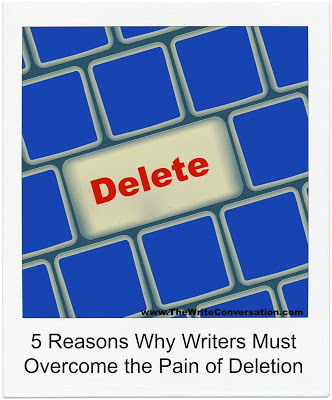 I get attached to the words I write. Do you?
I get attached to the words I write. Do you?
One of the hardest things about editing books is deleting sentences, paragraphs, and even whole pages.
It’s not easy to string words and ideas together, so why go through the pain of deleting them? Our words are our “babies.”
But the time comes when you have to consider whether every word is vital to a sentence, whether every sentence is needed, and whether every paragraph helps a chapter to be the best it can be.
So maybe I can smooth the inner turmoil a bit.
Here are some reasons why deleting is necessary to make our writing better.
1. Unnecessary words distract from your main point. Don’t let unneeded words distract the reader from the heart of your message. You may like a certain rabbit trail or want to include an extra illustration, but consider whether it will help your point or hinder it. See whether every word is serving a useful purpose. If you can delete a word or sentence and find that you’re not missing something important, it needs to go! Tight writing makes for excellent reading.
 Too many words in a sentence can hurt
Too many words in a sentence can hurt
the musicality of your writing2. Too many words in a sentence can hurt the musicality of your writing.Although it’s good to mix long and short sentences, too many long sentences can sound monotonous in the mind of the reader. You don’t want your sentences to sound burdened and weighed down. Remember that the words you write become a song for your reader to hear, so select words that add lyricism to your writing and delete words that muffle the melody.
3. Your book may need to start on a different page or in a different chapter.Sacrilege, right?! I found that Introductions are the hardest to write. Stay open to the possibility that the best place to start your book may not be on page 1. Since the beginning of a book needs to be as snappy and attention-getting as possible, I’ve found that it may be necessary to delete some paragraphs or pages to jump into the book’s message. Receiving feedback from a writers group or an impartial friend will help you to know whether your book starts at the right spot.
 Your writing is more about what the reader needs to hear
Your writing is more about what the reader needs to hear
rather than what you need to say.4. Your writing is more about what the reader needs to hear rather than what you need to say.Writing is definitely therapy for the soul, but a book shouldn’t be our personal venting platform. God can work through our joys and troubles and speak to others. We just need to know how much to divulge. We can take the lessons we’ve learned and share them with our readers, and perhaps they will reach their own “aha” moment when the truth of God clicks in their minds and hearts. Remembering our purpose in writing—to encourage, strengthen, or instruct—will help us to know what to include and what to leave out.
5. The reader will never know what was deleted. Did that one make you smile? We may agonize over what needs to be left out, but the reader will never know about our agony. Hopefully, what they read will be a heartfelt, prayed-over, edited and re-edited version of what we want to share with them. The published work will have so much love, insight, and wisdom poured into it, that the reader will be blessed. Much more than if they had read our first draft. A book improves with editing, prayer, and even deletion.
So take heart, my writer friend! The words you write are precious, and the words you leave in your book are even more so. They will speak to the reader, play a song in their head, and touch their heart.
When you delete something from your writing, do you find it a burden or a relief? What types of things do you tend to delete more than others? Share your thoughts below, and don’t forget to join the conversation!
TWEETABLESWriters love their words – 5 Reasons to cut what isn’tworking - @KatyKauffman28 (Click to Tweet)
5 Reasons why writers must overcome the pain of deletion – @KatyKauffman28 on @EdieMelson(Click to Tweet)
 Katy Kauffman is an award-winning writer and a co-founder of Lighthouse Bible Studies, a ministry which seeks to connect people to God through His Word.
Katy Kauffman is an award-winning writer and a co-founder of Lighthouse Bible Studies, a ministry which seeks to connect people to God through His Word.
She has taught the Bible to women and teens, and has two published Bible studies for women, 2 Timothy: Winning the Victory and Faith, Courage, and Victory. She is an editor of the new Refresh Bible Study Magazine and the designer of Broken but Priceless: The Magazine. She makes her home near Atlanta, Georgia.
 I get attached to the words I write. Do you?
I get attached to the words I write. Do you?One of the hardest things about editing books is deleting sentences, paragraphs, and even whole pages.
It’s not easy to string words and ideas together, so why go through the pain of deleting them? Our words are our “babies.”
But the time comes when you have to consider whether every word is vital to a sentence, whether every sentence is needed, and whether every paragraph helps a chapter to be the best it can be.
So maybe I can smooth the inner turmoil a bit.
Here are some reasons why deleting is necessary to make our writing better.
1. Unnecessary words distract from your main point. Don’t let unneeded words distract the reader from the heart of your message. You may like a certain rabbit trail or want to include an extra illustration, but consider whether it will help your point or hinder it. See whether every word is serving a useful purpose. If you can delete a word or sentence and find that you’re not missing something important, it needs to go! Tight writing makes for excellent reading.
 Too many words in a sentence can hurt
Too many words in a sentence can hurt the musicality of your writing2. Too many words in a sentence can hurt the musicality of your writing.Although it’s good to mix long and short sentences, too many long sentences can sound monotonous in the mind of the reader. You don’t want your sentences to sound burdened and weighed down. Remember that the words you write become a song for your reader to hear, so select words that add lyricism to your writing and delete words that muffle the melody.
3. Your book may need to start on a different page or in a different chapter.Sacrilege, right?! I found that Introductions are the hardest to write. Stay open to the possibility that the best place to start your book may not be on page 1. Since the beginning of a book needs to be as snappy and attention-getting as possible, I’ve found that it may be necessary to delete some paragraphs or pages to jump into the book’s message. Receiving feedback from a writers group or an impartial friend will help you to know whether your book starts at the right spot.
 Your writing is more about what the reader needs to hear
Your writing is more about what the reader needs to hearrather than what you need to say.4. Your writing is more about what the reader needs to hear rather than what you need to say.Writing is definitely therapy for the soul, but a book shouldn’t be our personal venting platform. God can work through our joys and troubles and speak to others. We just need to know how much to divulge. We can take the lessons we’ve learned and share them with our readers, and perhaps they will reach their own “aha” moment when the truth of God clicks in their minds and hearts. Remembering our purpose in writing—to encourage, strengthen, or instruct—will help us to know what to include and what to leave out.
5. The reader will never know what was deleted. Did that one make you smile? We may agonize over what needs to be left out, but the reader will never know about our agony. Hopefully, what they read will be a heartfelt, prayed-over, edited and re-edited version of what we want to share with them. The published work will have so much love, insight, and wisdom poured into it, that the reader will be blessed. Much more than if they had read our first draft. A book improves with editing, prayer, and even deletion.
So take heart, my writer friend! The words you write are precious, and the words you leave in your book are even more so. They will speak to the reader, play a song in their head, and touch their heart.
When you delete something from your writing, do you find it a burden or a relief? What types of things do you tend to delete more than others? Share your thoughts below, and don’t forget to join the conversation!
TWEETABLESWriters love their words – 5 Reasons to cut what isn’tworking - @KatyKauffman28 (Click to Tweet)
5 Reasons why writers must overcome the pain of deletion – @KatyKauffman28 on @EdieMelson(Click to Tweet)
 Katy Kauffman is an award-winning writer and a co-founder of Lighthouse Bible Studies, a ministry which seeks to connect people to God through His Word.
Katy Kauffman is an award-winning writer and a co-founder of Lighthouse Bible Studies, a ministry which seeks to connect people to God through His Word. She has taught the Bible to women and teens, and has two published Bible studies for women, 2 Timothy: Winning the Victory and Faith, Courage, and Victory. She is an editor of the new Refresh Bible Study Magazine and the designer of Broken but Priceless: The Magazine. She makes her home near Atlanta, Georgia.
Published on November 18, 2015 01:00
November 17, 2015
Think and Pray Before You Write!
by Lucinda Secrest McDowell @LucindaSMcDowel
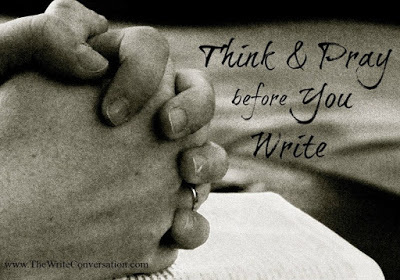 “Think before you speak!” is good advice.
“Think before you speak!” is good advice.
What about “Think before you write?” Not a bad idea either. And I would add to that, “Pray before you write.”
I’ve seen far too much writing launched out into the world these days with nary a thought or prayer as to whether or not the words are true, helpful and gracious.
Paul exhorted the people of Ephesus to “ lovingly follow the truth at all times—speaking truly, dealing truly, living truly—and so become more and more in every way like Christ who is the Head of his body, the Church.” (Ephesians 4:15-16 TLB)When you write a blog, post, story or book, do you ask if your words reflect a person who is becoming “more and more in every way like Christ?” Don’t you want your writing (and living) to be a reflection of God’s truth?
Then stop taking for granted what media shares as “truth” and be selective in your own platform.
 The original New Testament Greek word used in this Ephesians passage is alethia which not only refers to ethical truth, but truth in all its fullness and scope as embodied in Christ. Paul’s passion was that people would not only understand who they are in the vertical relationship with Christ, but also express their new identity in their horizontal relationship with each other.
The original New Testament Greek word used in this Ephesians passage is alethia which not only refers to ethical truth, but truth in all its fullness and scope as embodied in Christ. Paul’s passion was that people would not only understand who they are in the vertical relationship with Christ, but also express their new identity in their horizontal relationship with each other.
How we address controversial issues is important. There seems to be a steady digression into judgment and self-righteous bantering online lately. May I raise my hand and declare that I am so tired of current events being viciously argued over social media?
Recently I learned two new words: “Crowdpounding” is when the online community rages against someone or something that was said, tweeted, or blogged, with an avalanche of vindictive words is spewed on the screen and no real person has to take responsibility.
“Crowdaffirming” is the same sort of thing but in a vehement positive way that also can get weirdly out of control. But who wants to be part of a “crowd-anything?” We are called to be individuals and to answer to God as such.
Timothy emphasized that our words are a huge reflection of our walk. “Warn them before God against pious nitpicking, which chips away at the faith. It just wears everyone out. Concentrate on doing your best for God, work you won’t be ashamed of, laying out the truth plain and simple.” (2 Timothy 2.16 MSG) I believe that we communicators are to be salt and light in the world. Our voice must be heard. But may it never be a strident, judgmental voice. May our compassion and kindness be the ‘tact’ that accompanies truth.
I believe that we communicators are to be salt and light in the world. Our voice must be heard. But may it never be a strident, judgmental voice. May our compassion and kindness be the ‘tact’ that accompanies truth.
In his new book, “Fool’s Talk,” Os Guiness says “God’s truth requires God’s art to serve God’s end. Any Christian explanation or defense of truth must have a life, a manner and a tone that are shaped decisively by the central truths of the gospel. We Christians must seek to communicate in a way that is shaped by the One who sends us, and therefore by the pattern of the Incarnation, the Cross, and the Holy Spirit…it should always be evident that any power and persuasiveness in our communication comes from Him and not us.”
“Pious nitpicking” chips away at the faith and wears everyone out! Let’s make sure our words – both written and spoken – reflect the One we represent.
We can handle the truth in a winsome way!
“Finally, brothers and sisters, whatever is true, whatever is noble, whatever is right, whatever is pure, whatever is lovely, whatever is admirable—if anything is excellent or praiseworthy—[WRITE] such things.” (Philippians 4.8 NIV)
TWEETABLEThink & Pray Before You Write - words of wisdom from author @LucindaSMcDowel (Click to Tweet)
 Lucinda Secrest McDowell, M.T.S., is the author of 11 books, contributing author to 25 books, and has published in more than 50 magazines. A graduate of Gordon-Conwell Theological Seminary and Furman University, she studied at the Wheaton Graduate School of Communication and served as Communications Specialist for the Lausanne Committee for World Evangelization (Thailand) and Editor for Billy Graham’s International Conference for Itinerant Evangelists (Netherlands). A member of Advanced Writers and Speakers Association (AWSA), she has received “Writer of the Year” awards from both Mt. Hermon and Blue Ridge Writers Conferences. Cindy speaks internationally through her ministry “Encouraging Words” and co-directs the New England Christian Writers Retreat. Known for her ability to convey deep truth in practical and winsome ways, she writes from “Sunnyside” cottage in New England. Visit her online at www.EncouragingWords.net
Lucinda Secrest McDowell, M.T.S., is the author of 11 books, contributing author to 25 books, and has published in more than 50 magazines. A graduate of Gordon-Conwell Theological Seminary and Furman University, she studied at the Wheaton Graduate School of Communication and served as Communications Specialist for the Lausanne Committee for World Evangelization (Thailand) and Editor for Billy Graham’s International Conference for Itinerant Evangelists (Netherlands). A member of Advanced Writers and Speakers Association (AWSA), she has received “Writer of the Year” awards from both Mt. Hermon and Blue Ridge Writers Conferences. Cindy speaks internationally through her ministry “Encouraging Words” and co-directs the New England Christian Writers Retreat. Known for her ability to convey deep truth in practical and winsome ways, she writes from “Sunnyside” cottage in New England. Visit her online at www.EncouragingWords.net
Links www.NewEnglandChristianWritersRetreat.comBlog/website www.EncouragingWords.net
 “Think before you speak!” is good advice.
“Think before you speak!” is good advice.What about “Think before you write?” Not a bad idea either. And I would add to that, “Pray before you write.”
I’ve seen far too much writing launched out into the world these days with nary a thought or prayer as to whether or not the words are true, helpful and gracious.
Paul exhorted the people of Ephesus to “ lovingly follow the truth at all times—speaking truly, dealing truly, living truly—and so become more and more in every way like Christ who is the Head of his body, the Church.” (Ephesians 4:15-16 TLB)When you write a blog, post, story or book, do you ask if your words reflect a person who is becoming “more and more in every way like Christ?” Don’t you want your writing (and living) to be a reflection of God’s truth?
Then stop taking for granted what media shares as “truth” and be selective in your own platform.
 The original New Testament Greek word used in this Ephesians passage is alethia which not only refers to ethical truth, but truth in all its fullness and scope as embodied in Christ. Paul’s passion was that people would not only understand who they are in the vertical relationship with Christ, but also express their new identity in their horizontal relationship with each other.
The original New Testament Greek word used in this Ephesians passage is alethia which not only refers to ethical truth, but truth in all its fullness and scope as embodied in Christ. Paul’s passion was that people would not only understand who they are in the vertical relationship with Christ, but also express their new identity in their horizontal relationship with each other.How we address controversial issues is important. There seems to be a steady digression into judgment and self-righteous bantering online lately. May I raise my hand and declare that I am so tired of current events being viciously argued over social media?
Recently I learned two new words: “Crowdpounding” is when the online community rages against someone or something that was said, tweeted, or blogged, with an avalanche of vindictive words is spewed on the screen and no real person has to take responsibility.
“Crowdaffirming” is the same sort of thing but in a vehement positive way that also can get weirdly out of control. But who wants to be part of a “crowd-anything?” We are called to be individuals and to answer to God as such.
Timothy emphasized that our words are a huge reflection of our walk. “Warn them before God against pious nitpicking, which chips away at the faith. It just wears everyone out. Concentrate on doing your best for God, work you won’t be ashamed of, laying out the truth plain and simple.” (2 Timothy 2.16 MSG)
 I believe that we communicators are to be salt and light in the world. Our voice must be heard. But may it never be a strident, judgmental voice. May our compassion and kindness be the ‘tact’ that accompanies truth.
I believe that we communicators are to be salt and light in the world. Our voice must be heard. But may it never be a strident, judgmental voice. May our compassion and kindness be the ‘tact’ that accompanies truth.In his new book, “Fool’s Talk,” Os Guiness says “God’s truth requires God’s art to serve God’s end. Any Christian explanation or defense of truth must have a life, a manner and a tone that are shaped decisively by the central truths of the gospel. We Christians must seek to communicate in a way that is shaped by the One who sends us, and therefore by the pattern of the Incarnation, the Cross, and the Holy Spirit…it should always be evident that any power and persuasiveness in our communication comes from Him and not us.”
“Pious nitpicking” chips away at the faith and wears everyone out! Let’s make sure our words – both written and spoken – reflect the One we represent.
We can handle the truth in a winsome way!
“Finally, brothers and sisters, whatever is true, whatever is noble, whatever is right, whatever is pure, whatever is lovely, whatever is admirable—if anything is excellent or praiseworthy—[WRITE] such things.” (Philippians 4.8 NIV)
TWEETABLEThink & Pray Before You Write - words of wisdom from author @LucindaSMcDowel (Click to Tweet)
 Lucinda Secrest McDowell, M.T.S., is the author of 11 books, contributing author to 25 books, and has published in more than 50 magazines. A graduate of Gordon-Conwell Theological Seminary and Furman University, she studied at the Wheaton Graduate School of Communication and served as Communications Specialist for the Lausanne Committee for World Evangelization (Thailand) and Editor for Billy Graham’s International Conference for Itinerant Evangelists (Netherlands). A member of Advanced Writers and Speakers Association (AWSA), she has received “Writer of the Year” awards from both Mt. Hermon and Blue Ridge Writers Conferences. Cindy speaks internationally through her ministry “Encouraging Words” and co-directs the New England Christian Writers Retreat. Known for her ability to convey deep truth in practical and winsome ways, she writes from “Sunnyside” cottage in New England. Visit her online at www.EncouragingWords.net
Lucinda Secrest McDowell, M.T.S., is the author of 11 books, contributing author to 25 books, and has published in more than 50 magazines. A graduate of Gordon-Conwell Theological Seminary and Furman University, she studied at the Wheaton Graduate School of Communication and served as Communications Specialist for the Lausanne Committee for World Evangelization (Thailand) and Editor for Billy Graham’s International Conference for Itinerant Evangelists (Netherlands). A member of Advanced Writers and Speakers Association (AWSA), she has received “Writer of the Year” awards from both Mt. Hermon and Blue Ridge Writers Conferences. Cindy speaks internationally through her ministry “Encouraging Words” and co-directs the New England Christian Writers Retreat. Known for her ability to convey deep truth in practical and winsome ways, she writes from “Sunnyside” cottage in New England. Visit her online at www.EncouragingWords.net Links www.NewEnglandChristianWritersRetreat.comBlog/website www.EncouragingWords.net
Published on November 17, 2015 01:00
November 16, 2015
Get Your Blog Found with SEO and Keyword Basics
By Edie Melson @EdieMelson
 I know the title of this blog may strike fear in the hearts of some of you.
I know the title of this blog may strike fear in the hearts of some of you.
SEO (Search Engine Optimization) and Keywords sound like such technical things. But they are NOT difficult concepts to pick up.
Today, I’m going to give you a crash course in the basics to help you get your blog found.A Short Story to Illustrate the ConceptsLook at an anonymous business owner with me and I think you'll see what I mean. We'll call him Joe and he's a plumber.
He's a smart business owner and named his business, ABC Plumbing. He chose carefully because with that name, he had a good chance of being the first listing in the telephone directory under plumbers. That was ten years ago and that ad in the telephone directory kept him supplied with customers while it made him visible around the community. But as time went by, fewer people looked at the Yellow Pages when they needed a plumber. Instead they looked online.
Well Joe is a with-it sort of guy, so he had a website built. It wasn't fancy, but it did the job, just like the old ad in the directory. Actually the two looked a lot alike. But Joe began to see his traffic and customer base diminish. This was due to the fact that when someone searched on the Internet for a plumber in his area, his website didn't come up first. In fact, it didn't come up until page three of the search.
He did some research and found that he needed to add some things to his site to come up higher in the search engine. He came face-to-face with the new acronym SEO. Search Engine Optimization became his key to getting the name out about his business. So he started a blog and began tweaking the information on his site.
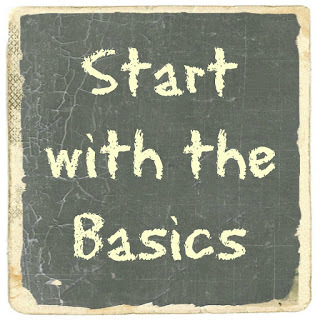 Keyword BasicsThe first term you need to become familiar with is
Keywords.
Keyword BasicsThe first term you need to become familiar with is
Keywords.
A keyword is like a label. It's a short way—although almost always more than one word in length—to state the purpose of your article. Articles can have several keyword groups or only one. I only have one main keyword group for this article and it's Writing for the Internet. You'll see this keyword in the labels following this post. You'll also see some related keywords, Internet, Internet Audience, Learn the Basics of Writing for the Internet, How to use Keywords Effectively.
I use groups of words because the point of the keywords is to direct the searcher to your website. You want your keywords to match, as closely as possible, what someone types into a search engine search box. People rarely type just one word because it gives too many options.
Here are the guidelines for using keywords effectively:Always use the keywords in the title.Repeat the keywords at least once in the first 50 words of your article.Spread the use of the keywords naturally and evenly throughout the rest of the article. (In a 400 word article that would mean using the keywords a minimum of three more times)SEO BasicsAnyone who’s spent any time writing content for the web or even researching this market, has run across the acronym SEO. Remember, this acronym stands for Search Engine Optimization. It's basically where, in the list of millions, your content will show up when searched by a reader (search engine). This is determined by a closely guarded, mathematical equation called an algorithm.
When you use different search engines—Google, Yahoo, etc., you'll notice each will give slightly different results from any given search, because they each have a proprietary calculation. But there are things we can do as writers to move our content up in the rankings. To accomplish this we have to have a basic understanding of how SEO algorithms work.
 Early on, these algorithms were less complex and depended heavily on keyword usage. Website writers would just use pages of keywords to raise their ranking. The search engines caught on and the equations got more complex. These algorithms will continue to evolve, with the goal being to give the searcher the most valuable sites first in the rankings.
Early on, these algorithms were less complex and depended heavily on keyword usage. Website writers would just use pages of keywords to raise their ranking. The search engines caught on and the equations got more complex. These algorithms will continue to evolve, with the goal being to give the searcher the most valuable sites first in the rankings.
Even with the evolution of algorithms, one thing hasn’t changed. They are still mathematical equations and as such, Search Engine Algorithms take words literally—and that can be good or bad.
This means that they don't always understand double meanings or the clever usage of words. For example, a recipe for vegetarian chili cleverly titled, Too Hot to Handle Chili will rank far lower than one titled, Homemade Vegetarian Chili. This is because an algorithm uses the literal meaning of words and the first title doesn’t even have the word “vegetarian” in it. Often times a clever title will result in fewer clicks.
This doesn't mean we can't be clever—only that we have to be deliberate in where and when we're clever. Take that chili recipe, give it a title that can be searched literally, like Hot and Spicy Vegetarian Chili, but in the description use the clever tag line—too hot to handle.
Very rarely, a clever title can work. This blog—The Write Conversation—is a clever play on words that works. Truthfully, I just got lucky. I chose the title of the blog before I knew what I was doing. The only reason it worked was because I wanted this site to be searchable for the keyword write as well as be clever about educating writers as an ongoing conversation.
As a writer, I love to play with words. Part of that play is coming up with literal—creative—titles. Instead of seeing SEO as a hindrance to that, I look at it as an added level of difficulty in a game I enjoy more than any other.
Next week we’ll talk more about choosing effective blog post titles. In the meantime, be sure to share your thoughts and questions in the comments section below.
Don’t forget to join the conversation!Blessings,Edie
TWEETABLESSEO& Keyword Basics for #Blogging Success - tips from expert blogger @EdieMelson (Click to Tweet)
Use SEO & Keywords to get your blog found - basics from blogger @EdieMelson (Click to Tweet)
 I know the title of this blog may strike fear in the hearts of some of you.
I know the title of this blog may strike fear in the hearts of some of you. SEO (Search Engine Optimization) and Keywords sound like such technical things. But they are NOT difficult concepts to pick up.
Today, I’m going to give you a crash course in the basics to help you get your blog found.A Short Story to Illustrate the ConceptsLook at an anonymous business owner with me and I think you'll see what I mean. We'll call him Joe and he's a plumber.
He's a smart business owner and named his business, ABC Plumbing. He chose carefully because with that name, he had a good chance of being the first listing in the telephone directory under plumbers. That was ten years ago and that ad in the telephone directory kept him supplied with customers while it made him visible around the community. But as time went by, fewer people looked at the Yellow Pages when they needed a plumber. Instead they looked online.
Well Joe is a with-it sort of guy, so he had a website built. It wasn't fancy, but it did the job, just like the old ad in the directory. Actually the two looked a lot alike. But Joe began to see his traffic and customer base diminish. This was due to the fact that when someone searched on the Internet for a plumber in his area, his website didn't come up first. In fact, it didn't come up until page three of the search.
He did some research and found that he needed to add some things to his site to come up higher in the search engine. He came face-to-face with the new acronym SEO. Search Engine Optimization became his key to getting the name out about his business. So he started a blog and began tweaking the information on his site.
 Keyword BasicsThe first term you need to become familiar with is
Keywords.
Keyword BasicsThe first term you need to become familiar with is
Keywords.
A keyword is like a label. It's a short way—although almost always more than one word in length—to state the purpose of your article. Articles can have several keyword groups or only one. I only have one main keyword group for this article and it's Writing for the Internet. You'll see this keyword in the labels following this post. You'll also see some related keywords, Internet, Internet Audience, Learn the Basics of Writing for the Internet, How to use Keywords Effectively.
I use groups of words because the point of the keywords is to direct the searcher to your website. You want your keywords to match, as closely as possible, what someone types into a search engine search box. People rarely type just one word because it gives too many options.
Here are the guidelines for using keywords effectively:Always use the keywords in the title.Repeat the keywords at least once in the first 50 words of your article.Spread the use of the keywords naturally and evenly throughout the rest of the article. (In a 400 word article that would mean using the keywords a minimum of three more times)SEO BasicsAnyone who’s spent any time writing content for the web or even researching this market, has run across the acronym SEO. Remember, this acronym stands for Search Engine Optimization. It's basically where, in the list of millions, your content will show up when searched by a reader (search engine). This is determined by a closely guarded, mathematical equation called an algorithm.
When you use different search engines—Google, Yahoo, etc., you'll notice each will give slightly different results from any given search, because they each have a proprietary calculation. But there are things we can do as writers to move our content up in the rankings. To accomplish this we have to have a basic understanding of how SEO algorithms work.
 Early on, these algorithms were less complex and depended heavily on keyword usage. Website writers would just use pages of keywords to raise their ranking. The search engines caught on and the equations got more complex. These algorithms will continue to evolve, with the goal being to give the searcher the most valuable sites first in the rankings.
Early on, these algorithms were less complex and depended heavily on keyword usage. Website writers would just use pages of keywords to raise their ranking. The search engines caught on and the equations got more complex. These algorithms will continue to evolve, with the goal being to give the searcher the most valuable sites first in the rankings.Even with the evolution of algorithms, one thing hasn’t changed. They are still mathematical equations and as such, Search Engine Algorithms take words literally—and that can be good or bad.
This means that they don't always understand double meanings or the clever usage of words. For example, a recipe for vegetarian chili cleverly titled, Too Hot to Handle Chili will rank far lower than one titled, Homemade Vegetarian Chili. This is because an algorithm uses the literal meaning of words and the first title doesn’t even have the word “vegetarian” in it. Often times a clever title will result in fewer clicks.
This doesn't mean we can't be clever—only that we have to be deliberate in where and when we're clever. Take that chili recipe, give it a title that can be searched literally, like Hot and Spicy Vegetarian Chili, but in the description use the clever tag line—too hot to handle.
Very rarely, a clever title can work. This blog—The Write Conversation—is a clever play on words that works. Truthfully, I just got lucky. I chose the title of the blog before I knew what I was doing. The only reason it worked was because I wanted this site to be searchable for the keyword write as well as be clever about educating writers as an ongoing conversation.
As a writer, I love to play with words. Part of that play is coming up with literal—creative—titles. Instead of seeing SEO as a hindrance to that, I look at it as an added level of difficulty in a game I enjoy more than any other.
Next week we’ll talk more about choosing effective blog post titles. In the meantime, be sure to share your thoughts and questions in the comments section below.
Don’t forget to join the conversation!Blessings,Edie
TWEETABLESSEO& Keyword Basics for #Blogging Success - tips from expert blogger @EdieMelson (Click to Tweet)
Use SEO & Keywords to get your blog found - basics from blogger @EdieMelson (Click to Tweet)
Published on November 16, 2015 01:00
November 15, 2015
Thoughts on Being a Submissive Writer
by Edie Melson @EdieMelson
 Thoughts on being a submissive writer - James 4:7I was talking with a good friend of mine, Torry Martin, at a recent conference, and we got into an interesting discussion. He mentioned that being submissive was something that writers don’t often consider. The look on my face must have clued him into my confusion because he went on. “It’s a natural progression, from submitting things for possible publication to the concept of submission.”
Thoughts on being a submissive writer - James 4:7I was talking with a good friend of mine, Torry Martin, at a recent conference, and we got into an interesting discussion. He mentioned that being submissive was something that writers don’t often consider. The look on my face must have clued him into my confusion because he went on. “It’s a natural progression, from submitting things for possible publication to the concept of submission.”
Wow.
I just sat there, amazed that I’d never considered that connection. He went on to say it was something I should write about. I tried to convince him to do it, but he said to consider it my first conscious act of writing submission.
So Torry, this one’s for you!
A Submissive Writer
Therefore submit to God. Resist the devil and he will flee from you. James 4:7
As writers, we’re constantly being called to submit, even if we don’t realize it. Of course there’s the obvious connection, when we submit our writing for possible publication. But there are other ways as well.We submit to God’s call when we put our words in tangible form—either handwritten or in a digital document.We submit to others when we share our words for critique.We submit when we invest our time and energy in organizations, classes and conferences.These acts of submission are part of the path we must follow to become a working writer. Beyond that, they are things we must practice—not something that we only do once or twice. This process is sometimes painful, but growth and obedience always are.
Submission is also an act that can bring on spiritual warfare.
When we draw a line in the sand and begin to follow God in obedience, it invites attack from the enemy. We can expect him to come after us in many ways.He tries to fill our days with busyness—often camouflaging it with good things to tempt us away from God’s best. He will use others to bring us down with negative words.He whispers in our minds how inadequate and bad our efforts are.He even tries to make us doubt what God Himself has shown us.But just like the verse in James states, submission empowers us. When we refuse to be drawn off God’s path, Satan will flee. Maybe he won’t disappear forever, but by submitting we have a powerful weapon to combat him.
These are my thoughts on being a submissive writer, I’d love for you to share yours in the comments section below.
Don't forget to join the conversation!
Blessings,
Edie
TWEETABLE
Thoughts on being a submissive writer - via @EdieMelson & @Torry_Martin (Click to Tweet)
 Thoughts on being a submissive writer - James 4:7I was talking with a good friend of mine, Torry Martin, at a recent conference, and we got into an interesting discussion. He mentioned that being submissive was something that writers don’t often consider. The look on my face must have clued him into my confusion because he went on. “It’s a natural progression, from submitting things for possible publication to the concept of submission.”
Thoughts on being a submissive writer - James 4:7I was talking with a good friend of mine, Torry Martin, at a recent conference, and we got into an interesting discussion. He mentioned that being submissive was something that writers don’t often consider. The look on my face must have clued him into my confusion because he went on. “It’s a natural progression, from submitting things for possible publication to the concept of submission.”Wow.
I just sat there, amazed that I’d never considered that connection. He went on to say it was something I should write about. I tried to convince him to do it, but he said to consider it my first conscious act of writing submission.
So Torry, this one’s for you!
A Submissive Writer
Therefore submit to God. Resist the devil and he will flee from you. James 4:7
As writers, we’re constantly being called to submit, even if we don’t realize it. Of course there’s the obvious connection, when we submit our writing for possible publication. But there are other ways as well.We submit to God’s call when we put our words in tangible form—either handwritten or in a digital document.We submit to others when we share our words for critique.We submit when we invest our time and energy in organizations, classes and conferences.These acts of submission are part of the path we must follow to become a working writer. Beyond that, they are things we must practice—not something that we only do once or twice. This process is sometimes painful, but growth and obedience always are.
Submission is also an act that can bring on spiritual warfare.
When we draw a line in the sand and begin to follow God in obedience, it invites attack from the enemy. We can expect him to come after us in many ways.He tries to fill our days with busyness—often camouflaging it with good things to tempt us away from God’s best. He will use others to bring us down with negative words.He whispers in our minds how inadequate and bad our efforts are.He even tries to make us doubt what God Himself has shown us.But just like the verse in James states, submission empowers us. When we refuse to be drawn off God’s path, Satan will flee. Maybe he won’t disappear forever, but by submitting we have a powerful weapon to combat him.
These are my thoughts on being a submissive writer, I’d love for you to share yours in the comments section below.
Don't forget to join the conversation!
Blessings,
Edie
TWEETABLE
Thoughts on being a submissive writer - via @EdieMelson & @Torry_Martin (Click to Tweet)
Published on November 15, 2015 01:00
November 14, 2015
One Little Step Forward
by Beth Vogt @BethVogt
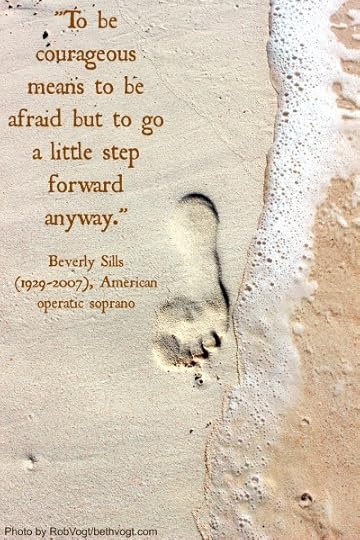 "To be courageous means to be afraid but to go a little step forward anyway."
"To be courageous means to be afraid but to go a little step forward anyway."
Beverly Sills (1929-2007), American operatic soprano
I believe that being courageous happens at the same time you are fear-filled.
You don’t wait for the fear to vanish, gather courage in your fists, and advance. No, true bravery manifests when someone whispers, “I’m scared” and then doesn’t back down from whatever enemy stands before them.
I also know that winning the day doesn’t always mean total victory. Sometimes it’s holding the ground you’ve already won. Or risking one … step … forward … and saying, “Tomorrow I will try again.”
I hang around a lot of courageous people. Some of my closest friends and I like to sing “Brave” by Sara Bareilles — it’s a vocal reminder to be brave, be ourselves, to step up, step out … to go for it, to go forward.
In Your Words: How’s your week been? What opportunity (or opportunities) did you have to be brave?
TWEETABLE"Courageous happens at the same time you are fear-filled" @BethVogt on @EdieMelson (Click to Tweet)
 Beth K. Vogt believes God’s best often waits behind the doors marked “Never.”
Beth K. Vogt believes God’s best often waits behind the doors marked “Never.”
A nonfiction writer and editor who said she’d never write fiction, Beth is now a novelist with Howard Books. She enjoys writing inspirational contemporary romance because she believes there’s more to happily-ever-after than the fairy tales tell us. Connect with Beth on her website, Twitter, Facebook, or check out her blog on quotes, In Others’ Words.
 "To be courageous means to be afraid but to go a little step forward anyway."
"To be courageous means to be afraid but to go a little step forward anyway."Beverly Sills (1929-2007), American operatic soprano
I believe that being courageous happens at the same time you are fear-filled.
You don’t wait for the fear to vanish, gather courage in your fists, and advance. No, true bravery manifests when someone whispers, “I’m scared” and then doesn’t back down from whatever enemy stands before them.
I also know that winning the day doesn’t always mean total victory. Sometimes it’s holding the ground you’ve already won. Or risking one … step … forward … and saying, “Tomorrow I will try again.”
I hang around a lot of courageous people. Some of my closest friends and I like to sing “Brave” by Sara Bareilles — it’s a vocal reminder to be brave, be ourselves, to step up, step out … to go for it, to go forward.
In Your Words: How’s your week been? What opportunity (or opportunities) did you have to be brave?
TWEETABLE"Courageous happens at the same time you are fear-filled" @BethVogt on @EdieMelson (Click to Tweet)
 Beth K. Vogt believes God’s best often waits behind the doors marked “Never.”
Beth K. Vogt believes God’s best often waits behind the doors marked “Never.” A nonfiction writer and editor who said she’d never write fiction, Beth is now a novelist with Howard Books. She enjoys writing inspirational contemporary romance because she believes there’s more to happily-ever-after than the fairy tales tell us. Connect with Beth on her website, Twitter, Facebook, or check out her blog on quotes, In Others’ Words.
Published on November 14, 2015 01:00



